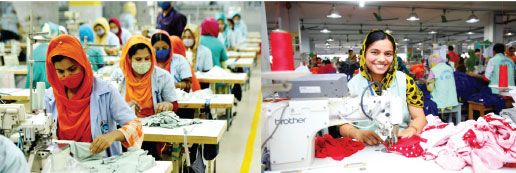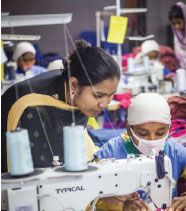- info@ficci.org.bd
- |
- +880248814801, +880248814802
- Contact Us
- |
- Become a Member
- |
- |
- |
- |
- |

Over the past few decades, Bangladesh has become a global hub for the ready-made garment (RMG) industry, transforming its socioeconomic landscape. From modest beginnings in the 1970s, when the sector earned only a few million dollars in exports, the RMG industry now stands as the largest contributor to the nation's economy. In 2023-24 alone, RMG exports reached $36.9 billion, accounting for 83% of the country's total exports.
This success story is closely tied to women's empowerment. Women make up the majority of the RMG workforce and have been pivotal to the sector's growth. Many came from rural agricultural backgrounds, transitioning to formal factory jobs. This shift has not only boosted productivity but also improved household incomes and national develop- ment. The female labor force grew from 16.8 million in 2013 to 25.8 million in 2022, with women's participation rising from 29% to 35%.

Women in the RMG sector have also driven significant socio-economic benefits. A 2020 International Labour Organiza- tion (ILO) study found that women invest more of their income in their rural families-53.1% versus 36.2% for men-and spend 1.8 times more on children's education, despite earning 20% less. This has contributed to rural economic growth, national development, and a rise in literacy rates. From 1997 to 2021, primary school enrollment increased by 21%, helping push the national literacy rate to 74.66% by 2022.
However, women's representation in the RMG sector is declining. Their share dropped from 80% in the 1980s to just 53% in 2023. Women remain concentrated in lower-level roles, primarily in sewing, while men dominate cutting and finishing tasks. Mechanization, which boosts production efficiency, is further reducing women's labor-intensive jobs.
 Despite, making up 97.1% of production roles, women are under represented in leadership. A 2023 BRAC University study found that only 1% of workers become supervisors, with social norms, educational gaps, and workplace biases limiting advancement. Gender-based challenges also persist, including weak enforcement of harassment laws and limited training opportunities.
Despite, making up 97.1% of production roles, women are under represented in leadership. A 2023 BRAC University study found that only 1% of workers become supervisors, with social norms, educational gaps, and workplace biases limiting advancement. Gender-based challenges also persist, including weak enforcement of harassment laws and limited training opportunities.
A promising solution lies in orange bonds, designed to fund gender equity initiatives. Bangladesh's government plans to launch a US$1 billion orange bond in collaboration with ERD, UNDP, and Impact Investment Exchange. These bonds could help drive further progress in gender equality, a key to sustaining Bangladesh's growth.
As Bangladesh moves into a post-LDC era, expanding women's contributions to the RMG sector is crucial for continued economic success. Prioritizing gender equity, leadership opportunities, and skill development will ensure a resilient and inclusive future.





